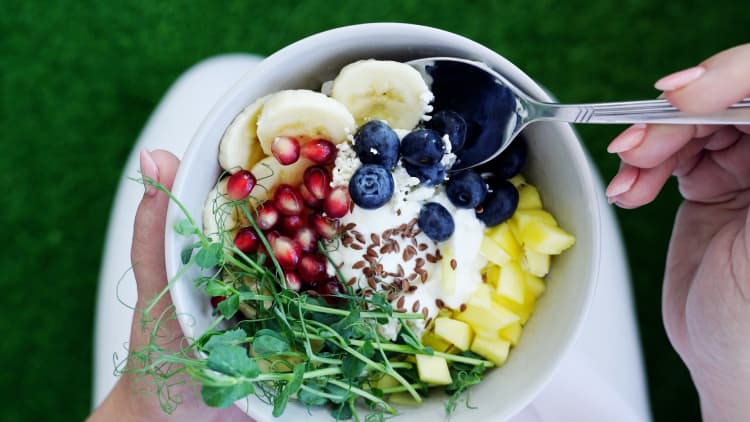There is a group of people longevity researchers call "SuperAgers," who are in their 80s and beyond but have the cognitive function of those who are decades younger.
SuperAgers are a great example of how both genetics and lifestyle choices play a role in how the brain ages.
In my book, "The Age-Proof Brain," I explore how they keep their brains young, boost immunity and memory, and fight neurological disorders like dementia. I also implement their habits into my own routine, especially when it comes to diet and exercise.
Here's what I eat and do in a typical day to keep my brain young, sharp and focused:
Hydrated mornings
I wake up at 7:00 a.m., and instead of drinking coffee, I have a tall glass of water. Our brain is made up of over 70% water, so hydrating helps maintain optimal activity.
After a 10-minute walk outside, I eat a protein-rich breakfast. Some of my favorite morning meals include:
- Instant plain oatmeal with berries and peanut butter
- Poached eggs and avocado, or bananas and almond butter, on whole-grain bread
- Scrambled egg tacos with cooked or raw spinach, black beans, diced tomatoes and guacamole
- Smoothie with leafy greens, berries, banana, steamed beets, Greek yogurt, nut butter and chia seeds
- Parfait layered with unsweetened Greek yogurt, berries and nuts
During the commute to drop my kids off at school, I'll ask them about what they're studying. It helps me learn something outside of my field, which is good for the brain. They also show me the latest music hits so I can attempt stay current.
The workday begins
I tackle my most difficult and creative tasks early in the day, when my brain is most alert. I try to take two-minute stretch breaks every 30 minutes.
At 11:30 a.m., I do a pre-lunch workout. During the summer, I'll go swimming, which has been shown to improve memory, cognitive function and energy.
Lunch is at around 12:30 p.m. Here are my go-to's:
- Whole-grain tortilla wrap with leafy greens, beans, and lean protein like tuna, salmon, tofu and chicken
- Sandwich with whole-grain bread and spinach, tomatoes, avocados and non-processed deli meat without nitrates
- Salmon with roasted vegetables and brown rice or quinoa
- Stir-fry with lean meats and vegetables like peppers, carrots, cauliflower, mushrooms and broccoli
- Chicken and avocado salad with blueberry balsamic dressing, with brown rice or whole-wheat pasta
- Salmon-avocado or cucumber sushi rolls made with brown rice, and a side of edamame or miso soup
Our brain thrives on social connection, so I also try to meet up with my parents, sister, a friend or my wife for lunch at least once a week.
Late afternoons: Back to work, brain snacks, exercise
In case my energy starts to lag, I always keep some healthy snacks nearby, like hummus, raw veggies, almonds, walnuts, bananas and cottage cheese.
On the drive home from work, I'll call an extended family member or friend to check in and hopefully share some laughs. Or, I'll listen to some standup, a funny audiobook or a podcast.
Three to four days a week, I spend 30 minutes to an hour playing sports. The brain loves a variety of physical activities, so I often switch it up with a bit of tennis, pickleball, basketball or a trip to the batting cages.
I also like to go for quiet walks in the park. Surrounding yourself in nature can have calming effects on stress-related regions of the brain.
Evenings with my family
Some of our favorite dinner meals include:
- Frittata with broccoli, asparagus, mushrooms, spinach, roasted red pepper and cherry tomatoes
- Salmon with roasted root vegetables and a bit of olive oil, and brown rice or quinoa
- Fajitas with chicken or tofu, black beans, bell pepper strips, and onions with whole-grain tortillas
- Snapper with miso and a side of steamed broccolini
- Grilled chicken with sweet potatoes and steamed green beans
- Lean pork chops with broccolini and zucchini noodles or whole-grain pasta
Once or twice a week, I like to play musical instruments with my family after dinner. Or, we'll finish a movie from the night before, although I usually end up getting distracted watching YouTube videos that they show me.
Before bedtime, I'll catch up on baseball news and talk to my wife about our day. At 9:30 p.m., it's time to shut off all devices and listen to some music before turning out the lights.
Weekends are for exploring, relaxing ... and a bit of nothing
I live in Southern California, and there's always so much to explore, whether it's a new restaurant, museum or park. Remember, newness is healthy for the brain.
My wife and I also plan date nights. We usually have a low-key dinner, then enjoy some live music, a show, or go to a sporting event.
Mostly, I prioritize fun on the weekends and make time to do a bit of nothing. Maybe put my feet up. Go to a garden and look at the flowers. Watch the sun set. These aren't really "nothing," but they're all things I'm grateful for and can easily miss during the week.
Marc Milstein, PhD, is a brain health expert and author of "The Age-Proof Brain: New Strategies to Improve Memory, Protect Immunity, and Fight Off Dementia." He earned both his PhD in Biological Chemistry and his Bachelor of Science in Molecular, Cellular and Developmental Biology from UCLA, and has conducted research on topics including genetics, cancer biology, neuroscience and infectious disease, and his work has been published in many scientific journals. Follow him on Twitter, Instagram and TikTok.
Don't miss:




